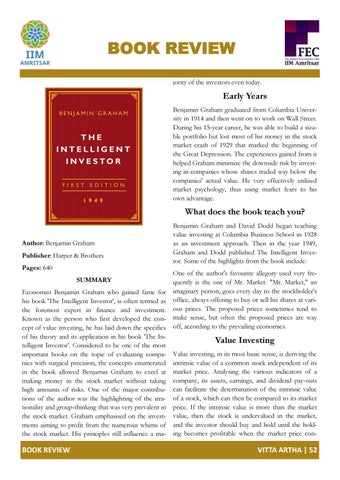BOOK REVIEW jority of the investors even today.
Early Years Benjamin Graham graduated from Columbia University in 1914 and then went on to work on Wall Street. During his 15-year career, he was able to build a sizable portfolio but lost most of his money in the stock market crash of 1929 that marked the beginning of the Great Depression. The experiences gained from it helped Graham minimize the downside risk by investing in companies whose shares traded way below the companies' actual value. He very effectively utilized market psychology, thus using market fears to his own advantage.
What does the book teach you? Author: Benjamin Graham Publisher: Harper & Brothers Pages: 640 SUMMARY Economist Benjamin Graham who gained fame for his book 'The Intelligent Investor', is often termed as the foremost expert in finance and investment. Known as the person who first developed the concept of value investing, he has laid down the specifics of his theory and its application in his book 'The Intelligent Investor'. Considered to be one of the most important books on the topic of evaluating companies with surgical precision, the concepts enumerated in the book allowed Benjamin Graham to excel at making money in the stock market without taking high amounts of risks. One of the major contributions of the author was the highlighting of the irrationality and group-thinking that was very prevalent in the stock market. Graham emphasised on the investments aiming to profit from the numerous whims of the stock market. His principles still influence a ma-
BOOK REVIEW
Benjamin Graham and David Dodd began teaching value investing at Columbia Business School in 1928 as an investment approach. Then in the year 1949, Graham and Dodd published The Intelligent Investor. Some of the highlights from the book include: One of the author's favourite allegory used very frequently is the one of Mr. Market. "Mr. Market," an imaginary person, goes every day to the stockholder's office, always offering to buy or sell his shares at various prices. The proposed prices sometimes tend to make sense, but often the proposed prices are way off, according to the prevailing economics.
Value Investing Value investing, in its most basic sense, is deriving the intrinsic value of a common stock independent of its market price. Analysing the various indicators of a company, its assets, earnings, and dividend pay-outs can facilitate the determination of the intrinsic value of a stock, which can then be compared to its market price. If the intrinsic value is more than the market value, then the stock is undervalued in the market, and the investor should buy and hold until the holding becomes profitable when the market price con-
VITTA ARTHA | 52










